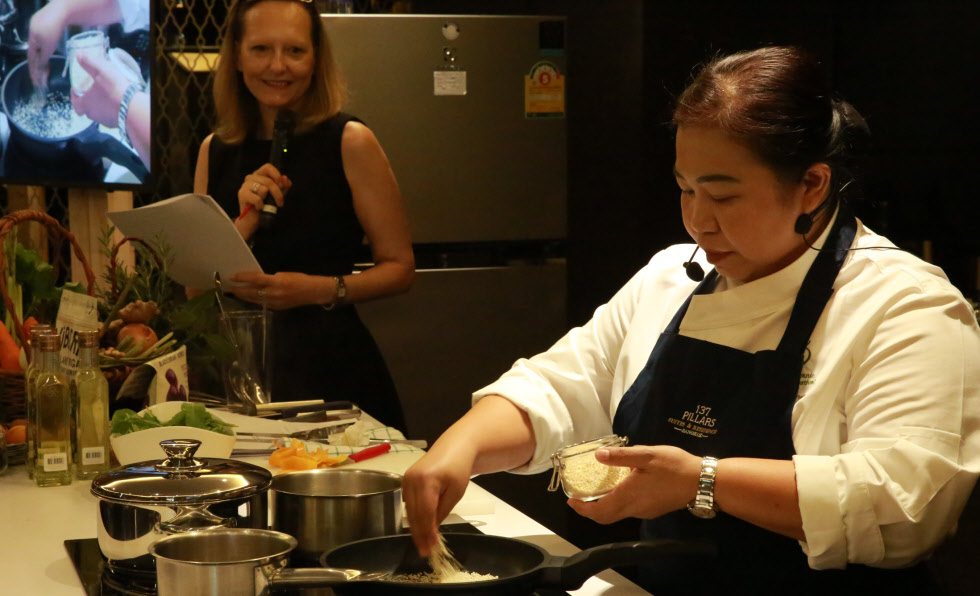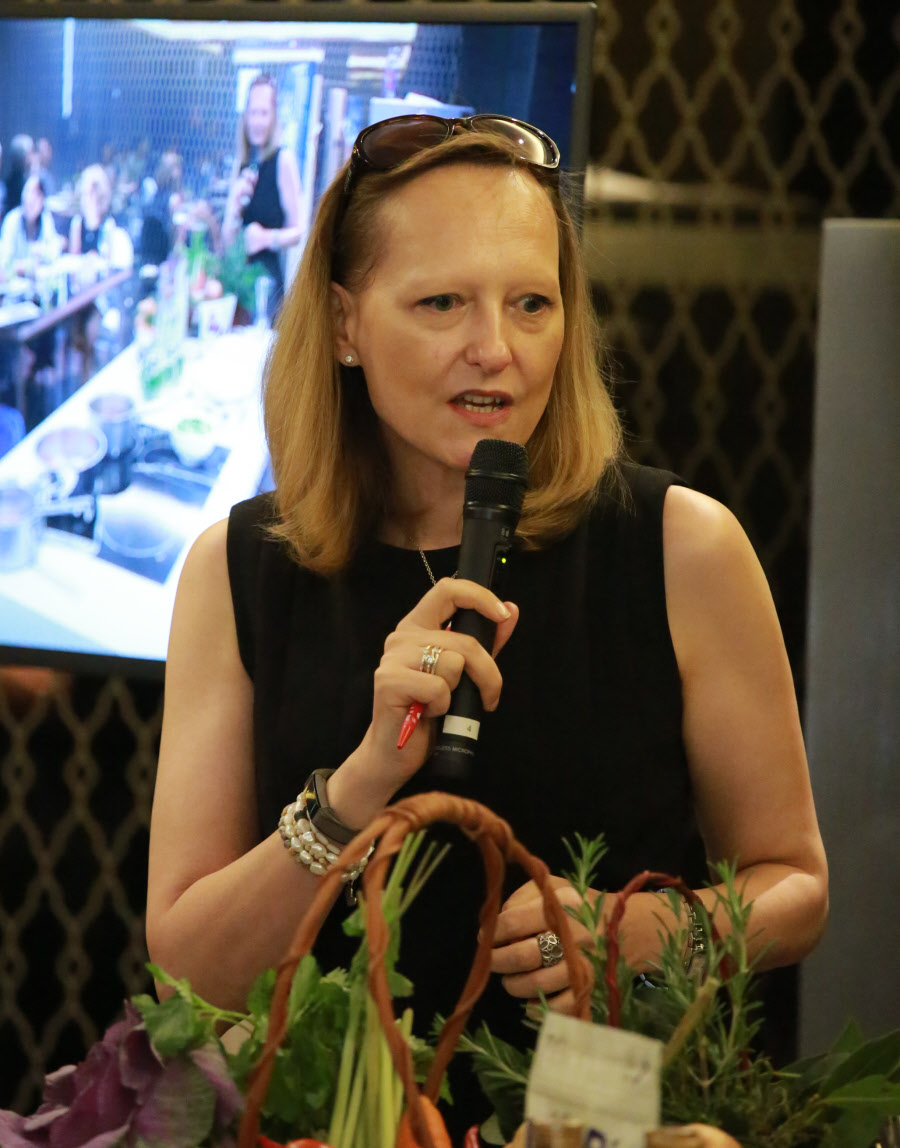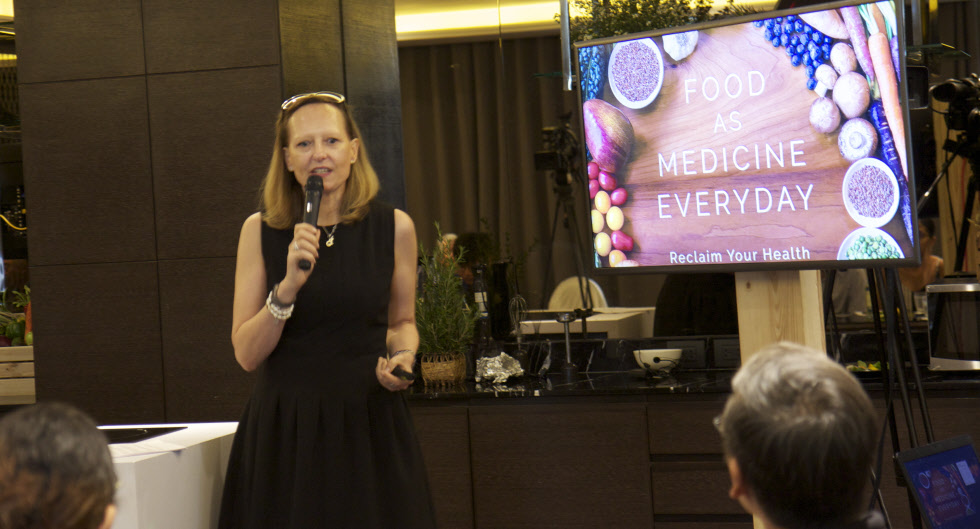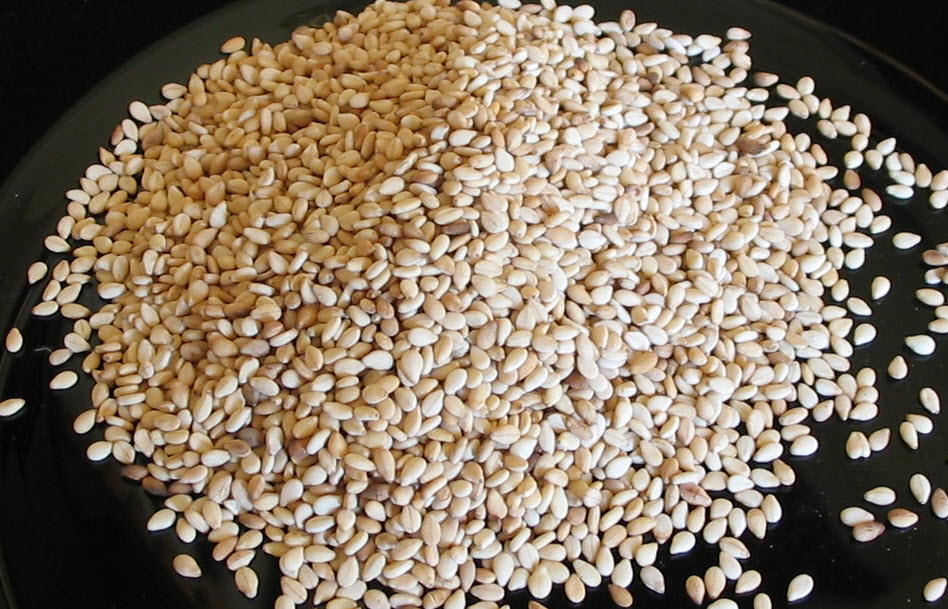– Tips for improved health, longevity through your diet in Asia
Isn’t it great to get to know as a westerner in Asia that there are some really beneficial herbs, fruits and vegetable to be found here in abundance! For those of you who have not searched, or did not know, it is never too late to learn!

Apart from the obvious recommendations most of us know well, like avoiding ‘white foods’, there is some really amazing produce to add to your diet that can serve the purpose of reducing unhealthy eating habits.
Depending on location in Asia one may also be in an environment where say a healthy meal cannot be bought at all. Then, home-cooking and food sourcing becomes even more essential. Given their comprehensive benefits, it is without any doubt worthwhile buying some of them at the grocery store or food market even when travelling, to add to the diet. And only a few would need to be cooked first.
Wellness specialist/lifestyle & nutrition coach Judith Coulson-Geissmann is our guide to a healthier lifestyle and how to get away from bad choices. She presented these ‘whole foods’ in a ‘Food as medicine everyday’ presentation in Bangkok held at 137 Pillars Suites & Residences’ ‘Asian Organic Gourmet Festival’ in March 2018. It is a really amazing list of things to drink and eat!

She calls them ‘food as medicine’ for a reason: they are traditional medicine items that can prevent bodily disorder or function as remedy. Getting to learn about all their benefits is really amazing; an awakening for many actually. These medicinal produce are, apart from a few seasonal ones, readily available all over Southeast Asia, so what are you waiting for!?
Their main benefits are mentioned. It is also relevant to point out that also medicinal food should be consumed in moderation. All quotes are by Judith Coulson-Geissmann from her presentation.
“As with any supplement ingredients you can overdose. It is not like: because these traditional medicine items are good for you, take as much as possible. A lot of times these ingredients have the effect with very small doses as well.”
Water advice
It was disturbing to learn that the in Asia so common reversed osmosis drinking water is not really doing one’s health any good at all!
“Water is one of the most important ingredients in your health. Make sure you drink enough on a daily basis and you’ll have a lot less issues. Also, it can prevent ache and give you a lot more energy.”
In many Southeast Asian countries you get so called RO (reversed osmosis) water. “Unfortunately that process strips the water from all the minerals, vitamins and trace elements. That makes the water slightly acidic, and if you live in a stressful environment, such as Bangkok, your normal acidic level is already high. To add more acidity with acidic water I personally would avoid anywhere I can. If you have a choice, choose a mineral water; it’s more alkaline and can bring your acidic level down.”
She personally thinks RO water is dangerous in the long run. This type of water actually leaches vitamins and minerals from the body and leads to magnesium deficiency! The World Health Organisation has issued a warning on this.
If staying or having meetings in a hotel and drinking hotel water, usually RO, Judith makes sure to eat something that can balance it out, for example having an oatmeal breakfast, or “anything that contains a lot of minerals”.

Marian Plum (Gandaria Bouea)
Cultivated in Indonesia, Borneo, the Philippines and Thailand. This fruit is one of the few produce in this list that are seasonal, in Thailand limited to the main fruit season, which falls during April to May.
“Mario Plum can be used for salads and this fruit can aid many things thanks to specific ingredients. It contains a lot of vitamin C; every kind of vegetable or fruit that is yellow or red contains a lot of vitamin C, which is crucial for many functions in your body. It can clear up your skin but also help in cancer prevention. Its antioxidants can make you cells healthier. The Marian Plum can also speed up healing, so it helps your cells to also rejuvenate.”
Beta carotene is one of the ingredients found in Marian Plum, which helps to maintain the eye health.
“It helps blood circulation as well, because it contains a lot of water. So it helps also the functions of your brain, which mostly feeds on water and glucose.”

Sesame seeds
Sesame seeds are extremely beneficial for your health but are often overlooked. They are a great supplement that can easily be added to lots of meals and could be brought along when travelling. “Sesame seeds can be added to almost anything. Cereal, salads, or sprinkle it over meat.”
Unsurprisingly, Judith says it is one of her favourites. “They’re a real powerhouse of minerals, unsaturated oils and vitamins and highly underestimated in general. Sesame seeds have a wide range of phytochemicals that can protect your cells against radiation, one of the contributors to cancer development.”
They improve oral health and aid the body’s metabolic function. They are anti-inflammatory, and can reduce joint pain and inflammation in your body to prevent several illnesses – cholesterol, high blood pressure and diabetes.
“They improve digestion; most people have some gastro-intestinal issues these days. But where they can really help you in Asia is for the calcium – sesame seeds have more calcium than milk!”
The impressive levels of essential minerals like zinc, calcium and phosphorus found in sesame seeds can be a major boost for your health. These minerals are integral part in strengthening and repairing bones, building muscle tissue, hair and skin. Sesame seed oil also reduces the appearance of burns, and scars, and reduces signs of premature aging.
Black sesame seeds are more fibre-rich. “Fibre is something we should be aware of and eat more than 26 grams of daily. A fibre-rich diet can prevent high cholesterol levels, aid a healthy digestion and even prevent some cancer. A lot we eat is processed so the fibre content is very low.”
Hibiscus Roselle tea (Reduction)
Health benefits include its ability to treat high blood pressure, high cholesterol, disturbed digestive and immune system, and inflammatory problems as well.
“Roselle tea is one of my all-time favourites. I have daughters and I don’t know why, but today most women have issues with menstruation pain and cramps. Rosella tea can help you; it is high in Vitamin C and the phytochemical properties of Rosella tea can relieve pain, including menstruation pain.”
Its antioxidant properties can help to detoxify your liver: “A lot of people struggle with fatty liver disease these days. This disease is not only related to excessive alcohol consumption but can develop if you eat the wrong type of food over a long period of time.”
Roselle tea has anti-cancer properties, Antioxidants help to protect your body from diseases because they neutralise the free radicals present in tissue and cells.
It can aid weight loss because of its vitamin C content. Also, it can act as anti-depressant.
Cod fish
“I was very surprised in how many ways it is beneficial! It has some of the same properties as salmon in the way that it has 0mega-3 oils and thereby anti-cancer properties. And that’s why it is beneficial for a number of things, including aiding the cell reproduction, so it is an anti-aging ingredient. It can also aid leukaemia, increase the immunity level, and as it is high in protein it increases your muscle health.”
Skin health: the selenium and vitamin E can work wonders on your skin, and help prevent premature aging. The selenium can also prevent asthma attacks by producing antioxidants.
“However, fish in general – like any food today – you have to make sure where you get it from. The quality makes a difference as it can have quite high level of heavy metals.”

Turmeric
Turmeric’s amazing health benefits include its ability to reduce inflammation, heal wounds, improve skin health and ease menstrual difficulties. And it is a brain-boosting herb.
“Turmeric’s my all-time favourite! I have turmeric with me everywhere I go. This is one of the most important knowledge I have been taking home – the benefits of turmeric,” Judith introduces the herb.
“You should add to your daily cooking routine. It does not have much taste if you put a little dash of it and that is already enough. I started to use it on daily basis in the food I cook for my children and they haven’t been sick for ten years! Turmeric is a natural anti-biotic.”
“It improves heart health, detoxifies the body. It can help with depression. It has a lot of inflammatory agents so it can prevent pain. It aids gastro-intestinal issues and can help with weight loss.”
Turmeric helps accelerate the metabolism rate and lets your body burn a significant number of calories, leading to weight loss.
“The powder is as powerful as fresh turmeric in my opinion.”
Ginger
Health benefits include its ability to boost bone health, strengthen the immune system, prevent various types of cancer, reduce excess gas (also dangerous to your health) etc.
“It can improve bone health because being high in minerals as well. It has anti-inflammatory properties, and treats diarrhoea. And if you feel bloated it will help against that. And I always use it if I feel I am getting a cold or start sneezing.”
“I cook ginger tea in a big pot. It helps you to start the metabolism, just to get you going and your tooth flowing. It also wakes you up as it has some stimulates.”
“You do not need to drink a lot. A glass or two is already enough,” adds Judith.
More on food as medicine and Judit’s advice will follow in part two.
